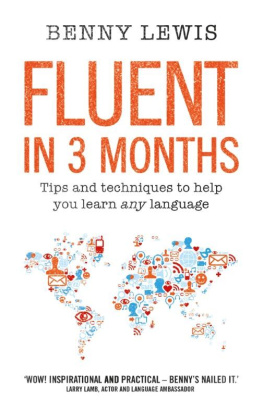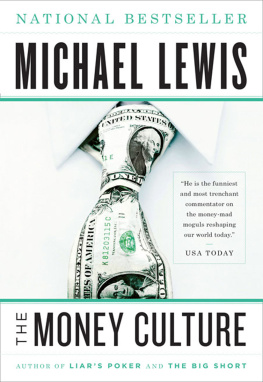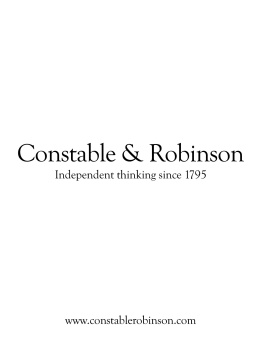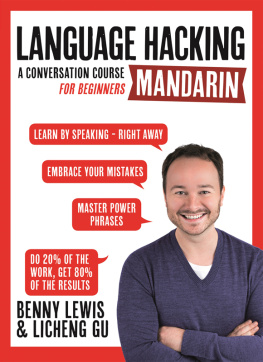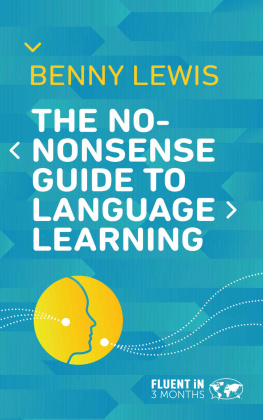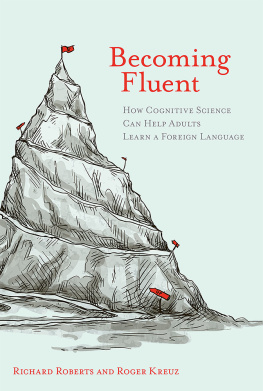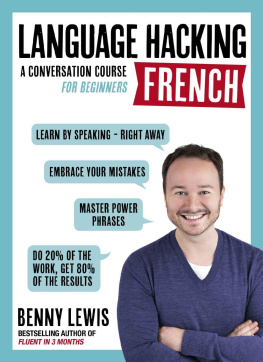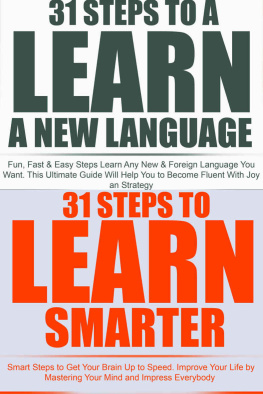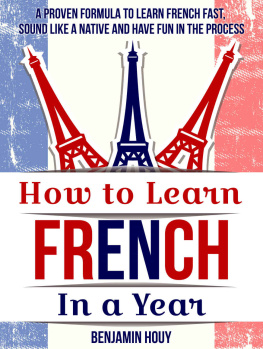Lewis - Fluent in 3 months: tips and techniques to help you learn any language
Here you can read online Lewis - Fluent in 3 months: tips and techniques to help you learn any language full text of the book (entire story) in english for free. Download pdf and epub, get meaning, cover and reviews about this ebook. City: London, year: 2014, publisher: HarperCollins Publishers, genre: Children. Description of the work, (preface) as well as reviews are available. Best literature library LitArk.com created for fans of good reading and offers a wide selection of genres:
Romance novel
Science fiction
Adventure
Detective
Science
History
Home and family
Prose
Art
Politics
Computer
Non-fiction
Religion
Business
Children
Humor
Choose a favorite category and find really read worthwhile books. Enjoy immersion in the world of imagination, feel the emotions of the characters or learn something new for yourself, make an fascinating discovery.
Fluent in 3 months: tips and techniques to help you learn any language: summary, description and annotation
We offer to read an annotation, description, summary or preface (depends on what the author of the book "Fluent in 3 months: tips and techniques to help you learn any language" wrote himself). If you haven't found the necessary information about the book — write in the comments, we will try to find it.
Lewis: author's other books
Who wrote Fluent in 3 months: tips and techniques to help you learn any language? Find out the surname, the name of the author of the book and a list of all author's works by series.
Fluent in 3 months: tips and techniques to help you learn any language — read online for free the complete book (whole text) full work
Below is the text of the book, divided by pages. System saving the place of the last page read, allows you to conveniently read the book "Fluent in 3 months: tips and techniques to help you learn any language" online for free, without having to search again every time where you left off. Put a bookmark, and you can go to the page where you finished reading at any time.
Font size:
Interval:
Bookmark:

Your story, like mine, begins and ends with passion the surest path to learning a new language.
Stop making excuses. Theres simply no reason you cant learn a new language, and Ill tell you why.
Do away with vague daydreams, such as learn Spanish, by setting specific end goals within specific time frames and incorporating new language-learning techniques to achieve concrete results.
If you dont have the memory of a supercomputer, dont worry. This chapter explains why we forget things and teaches a much more efficient and fun way to remember foreign words.
You dont need to be in a foreign country to learn the language. You can do it from the comfort of your home or local community.
Start speaking a new language right away with easy-to-follow cheats for when you dont know the words you want to say.
Learning a specific language is easier than you think. Here I tell you why.
Strive towards fluency, and beyond, by coming back to the academic aspects better suited to this part of the language-learning process.
Its time to go beyond fluency by adapting to the local culture, until a stranger mistakes you for a native!
Take language-learning to the next level. Speak multiple languages without mixing them up or forgetting the ones youve already mastered.
Study a new language beyond spoken practice sessions with invaluable and mostly free resources.
Your story, like mine, begins and ends with passion the surest path to learning a new language.
I n late July 2003, just a couple of weeks after my twenty-first birthday, I moved to Valencia, Spain. To help me adjust to life in a foreign country, I enrolled in a Spanish class.
It was a small class, and it was taught entirely in Spanish, which was a bit of a problem for me because I only understood English. I had just graduated with a degree in electronic engineering, and I had barely passed the German and Irish courses I took in high school and college. Languages were definitely not my thing.
After several classes, I was getting absolutely nowhere. Each lesson ended with the other students wearing great big satisfied smiles on their faces. I knew they had figured out something about the language that they didnt know before, while I still couldnt understand a single thing. My ego was destroyed. I was, without a doubt, the worst student in the class, and as I walked home with my head hung low, I couldnt help thinking, Its not fair! Why were those guys blessed with the language-learning gene and I wasnt? Im never going to learn Spanish.
After six months in Spain, I could barely muster up the courage to ask how much something cost or where the bathroom was. I really started to think I would never learn Spanish. I began to worry my experience immersed in a different country would be a total failure. I was convinced my destiny was to spend the rest of my life speaking only English.
Fast-forward seven years. One night in Budapest, I ended up at a couchsurfing party at a local bar with an international crowd. I confidently strolled in and said hello to everyone in Hungarian, one of the most notoriously difficult languages in the world. I started chatting with a local, in Hungarian, about my progress with his native language. I had been learning it only for about five weeks, but I was still able to have this rudimentary chat with him.
Next, I noticed a slight Brazilian Portuguese accent from the guy speaking English to my left. I asked, Voc brasileiro? (Are you Brazilian?), and when he told me, in Portuguese, that he was from Rio, I immediately switched to my Carioca accent, using slang from his own city, telling him how much I missed it. He was shocked to hear an Irish guy speak his own Portuguese dialect in a random bar in Budapest!
Then I recognized a Spanish friend of mine across the table and immediately switched to fluent Spanish, asking her how her Hungarian was coming along. Later, a couple from Quebec arrived, and I turned on my Quebec accent and expressions while speaking French. We exchanged contact information and made plans to hang out the next day.
That night I also managed to use some Italian and Esperanto and wowed a Thai tourist with a few phrases of basic Thai, using all the right tones. I even flirted in German with a German girl I saw regularly at these meetings.
In one evening I spoke eight languages (including a little English) casually, socially, and naturally. I switched between them effortlessly, without mixing them up, and more importantly made some amazing new friends in the process.
Since then Ive learned several other languages, and at the time of writing this, I can confidently use twelve languages in varying degrees of proficiency, from conversational Dutch, Mandarin, Chinese, and American Sign Language to certified mastery in Spanish and everything in between for the other nine. I understand the basics of another twelve languages on top of these. I also run Fluentin3months.com, the worlds largest language-learning blog, which, to date, has helped millions of people around the world learn a new language.
All of this is true despite the fact that I spoke only English until the age of twenty-one and did poorly in my attempts to learn languages in school.
How did this happen? How did I go from dropping out of my Spanish language class to being able to converse in more than a dozen languages? Simply by changing how I approach new languages.
One of the biggest issues with a traditional approach to language-learning is that the benefits of picking up a new language are constantly postponed. Study this and study that and then, if youre lucky, in a few years time, youll eventually understand the language. As well as being far from the truth, this approach removes the fun and the life from the process.
In many education systems, especially in English-speaking countries, languages are taught the same way as any other subject, like geography or history. Teachers provide the facts (vocabulary) so the student will know the language. Or, as in mathematics, students do the exercises to understand the rules (grammar).
Except on rare occasions, this approach does not produce speakers of the target language, so something clearly needs to be fixed. A language is a means of communication and should be lived rather than taught.
A teachers primary role should be as a language facilitator. A teacher should make sure students use the target language at whatever level they happen to be at, rather than keep them quiet while he or she does all the talking, trying to transfer the informational components of the language into the students brains.
In high school, I had to learn Irish. It was mandatory and, in order to gain admission to university, I needed to pass my exams. As a result, I only cared about learning enough Irish to pass; I didnt care about the language itself.
My attitude towards Irish changed completely when I actually took the time to live in the Gaeltacht region of Ireland, where people still speak the language, and I started to make friends using it.
The second language I took in high school was German. I took German because Germany is an important economy in Europe, and I figured it would look good to have this language on my CV. German language skills would help me stand out, especially since most people in my year were studying French. Once again, I didnt care about the German language; I just thought learning it might give me secondary benefits. And, of course, I barely retained anything. I thought German was nothing more than
Next pageFont size:
Interval:
Bookmark:
Similar books «Fluent in 3 months: tips and techniques to help you learn any language»
Look at similar books to Fluent in 3 months: tips and techniques to help you learn any language. We have selected literature similar in name and meaning in the hope of providing readers with more options to find new, interesting, not yet read works.
Discussion, reviews of the book Fluent in 3 months: tips and techniques to help you learn any language and just readers' own opinions. Leave your comments, write what you think about the work, its meaning or the main characters. Specify what exactly you liked and what you didn't like, and why you think so.

